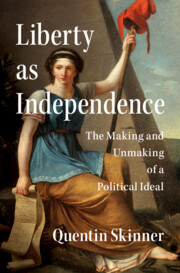
- Coming soon
- Publisher:
- Cambridge University Press
- Expected online publication date:
- January 2025
- Print publication year:
- 2025
- Online ISBN:
- 9781139226677

What does liberty entail? How have concepts of liberty changed over time? And what are the global consequences? This book surveys the history of rival views of liberty from antiquity to modern times. Quentin Skinner traces the understanding of liberty as independence from the classical ideal to early modern Britain, culminating in the claims of the Whig oligarchy to have transformed this idea into reality. Yet, with the Whig vision of a free state and civil society undermined by the American Revolution of 1776, Skinner explores how claims that liberty was fulfilled by an absence of physical or coercive restraint came to prominence. Liberty as Independence examines new dimensions of these rival views, considering the connections between debates on liberty and debates on slavery, and demonstrating how these ideas were harnessed in feminist discussions surrounding limitations on the liberty of women. The concept of liberty is inherently global, and Skinner argues strongly for the reinstatement of the understanding of liberty as independence.
‘The ideal of liberty as independence from arbitrary power was hegemonic from the Roman Republic to the Age of Revolutions until it was rapidly, and seemingly irreversibly, replaced by the reigning notion of liberty as the absence of restraint. No one has done more to excavate the genealogies of these two concepts of liberty than Quentin Skinner. Liberty as Independence draws on decades of research and reflection to present a magisterial account of the anti-democratic and counter-revolutionary displacement of liberty as self-rule and of the prospects for recovering independence as a critical political value.’
David Armitage - Harvard University
‘In this spectacular book, Skinner takes his story of neo-Roman freedom into the Enlightenment, showing why one view of freedom overturned another, and what was lost in that displacement. Skinner casts a chilling shadow over our current liberal dispensation, opening up an alternative vision of democratic freedom – one that has the power to transform the lives of all those who are subject to the arbitrary will of another.’
Hannah Dawson - King’s College London
‘In this rich and masterly excavation of liberty in political thought, Quentin Skinner shows how liberty understood as independence was vanquished in the liberal era. With brilliant clarity and unmatched attention to the powerplay behind intellectual discourse, he unveils the liberal victory as the loss of an egalitarian and democratic ideal.’
Lena Halldenius - Lund University
‘Quentin Skinner extends his powerful account of liberty as independence, from classical roots into the eighteenth century’s sermons and novels as well as pamphlets and treatises, and in the hands of abolitionists among others. Skinner argues that the ideal was ultimately overturned by opponents of the radical movements it inspired.’
Melissa Lane - Princeton University
‘We live in the midst of democratic crisis but these tend also to be times when purposive change becomes possible. This is why Liberty as Independence is such a significant book that urgently needs to be engaged with. There is no better guide to liberty and its history in free states than Quentin Skinner. He remains the most lucid of writers and the most brilliant of intellectual historians.’
Richard Whatmore - University of St Andrews
 Loading metrics...
Loading metrics...
* Views captured on Cambridge Core between #date#. This data will be updated every 24 hours.
Usage data cannot currently be displayed.